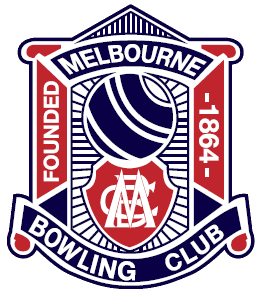Club History
The Melbourne Bowling Club is situated on a large corner block behind Chapel Street, Windsor; dwellings and commercial properties surround the whole. The Clubhouse includes the original double story brick building in Georgian style with a long single story building added to the side in the 1923. The original building had upper and lower verandas with ornate iron-lace work, which were later removed during renovations.
A neighboring house was incorporated into the extension to provide a gaming room which was entered directly from Union Street. The original building house offices and the billiard tables while the extension contains all the honour boards and a trophy cabinet. This cabinet contains the minute books dating from the formation of the club and other trophies and gifts from visiting clubs. The extension, is a long room with the bar on one side and large windows on the other side which look onto the two greens, has a typical 1970’s decor.
The two paintings by T.S. Gill of the club in 1867 hang in this room above the trophy cabinet. The Club is conscious of its standing as the oldest in Australia and work continues to be done to restore and renovate the Honour Boards and various pieces of furniture. The 2 main greens comprise 7 rinks each and are separated by a concrete walkway with covered seating at each end of the rinks. There are two smaller greens to the side. The grounds include an attractive garden.
1864
11 March
This day the Melbourne Bowling Club was founded by John Campbell, obtaining a lease of land at “Chapel Street” (sic) from Mr Sayce, for a period of ten years of the annual rental of Twenty Pounds, payable half yearly on 11 September and 11 March each year. (First entry in the records in the handwriting of John Campbell). Thus making Melbourne the oldest bowling club in Australia
27 October Greens opened. A bar was established occupied by John Campbell. Quoits were available for those not playing bowls, whilst one portion of the green was occupied by lady visitors pursuing the game of croquet.
1865
182 gentlemen enrolled. With a projected deficit for season 1865-66 of three hundred pounds the entrance fee was increased to two guineas and the annual subscription also to two guineas. Because of this increase a breakaway group formed the Prahran Bowling Club.
16th September 1865. The green was opened. The entrance fee being 10/6d and the annual subscription 10/6d. It became known as the Tradesmen’s Club but closed in 1871.
1866
A shelter to house the bar was built by John Campbell, this shelter was known later as the ‘Veranda’
1867
The painter S. T. Gill visited the Melbourne Bowling Club and pointed two water-colour paintings of a bowls match in progress, one of the summer green and one of the winter green. (These paintings are still property of the club)
1868
21 August
The Club became the possessor in fee simple of their Green. Plans were mooted to build a pavilion. In the interim Mrs West was granted the lease of the bar at 2 pounds, 18 shillings and 4 pence per month this sum was later reduced to one pound per month.
1870
8 November
The keys to the new pavilion were handed over by the contractor.
1873
The first Grand Bowling Tournament was played between six Melbourne Clubs. This tournament became an annual event and after the formation of the Victorian Bowling Association became the V.B.A. President’s Trophy.
1874
August 8th
The Skittle Alley was completed. The alley was found under the billiard room floor during recent renovations – has now been concreted over.
1875
Gas light installed in the pavilion.
1880
14th April
First inter-colonial match played between a team chosen from members of the various Melbourne clubs to be played in Sydney. The formation of the NSW Bowling Association resulted from this match
23rd July
The Victorian Bowling Association was formed
1887
28th December
The new club pavilion was officially opened
1899
Melbourne Bowling Club player, Major B.J. Wardill, in England to watch the Australian Cricket team under the captaincy of Joe Darling, met with him and English bowler Mr S.E. Yelland. As a result of the meeting, Major Wardill arranged for the Victorian and NSW Association Presidents, also travelling to England, to meet with Mr Yelland, resulting in the formation of the Imperial Bowling Association, becoming the International Bowling Board, now World Bowls Ltd, the governing body for bowls world-wide.
1923
15 September
The foundation stone is laid for the new extensions to the Club rooms
1950’s
A successful period for Melbourne Bowling club when it won many championships. Acquired surrounding properties with the view to future extensions
1964
Extension to the bar area
Melbourne Bowling club was a Men’s club until 1998. Current membership stands at 170 with fees of $200 (GST Incl) per year. Fifty percent of the membership lives within 2 kms of the club.
1991
Christmas 1991, internal and external photographs
June 2006
relaying of the carpet
The following are copies of original articles appearing in various newspapers, dating from 1865 onward. Some of these articles have been replicated in plain text in the News Page

























